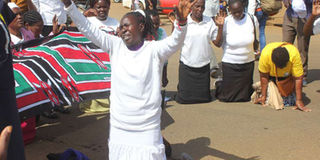Women bear the brunt of election violence

Women pray on the streets of Eldoret town, Uasin Gishu County, on August 7, 2017. ‘Peace’ is a word that must resonate with every Kenyan, more so women. PHOTO | JARED NYATAYA | NATION MEDIA GROUP
What you need to know:
- August 8 is the culmination of one of the longest and most bruising election campaigns Kenya has ever known.
- As mothers, wives, sisters, daughters and voters, we must condemn violence in the strongest possible terms.
My Presbyterian orientation enjoins me to the priesthood of all believers.
I hope you will forgive me for being a little preachy this time. Tuesday, August 8, is a day like no other.
It is the culmination of one of the longest and most bruising election campaigns Kenya has ever known.
DECISION
Truth be told, campaigns for Tuesday’s elections began immediately after Supreme Court Judge Willy Mutunga declared Mr Uhuru Kenyatta the President after a five-minute ruling in 2013.
Although the manner in which the judgment was handled has exercised the minds of legal scholars and commentators since that Saturday, March 30, 2013, it is not the subject of this opinion.
We have come full circle, and on Wednesday, Kenyans will know who will steer the nation until 2022.
PEACE
In the countdown to this day, when some 20 million registered voters are expected to cast their ballots, few words have been bandied about more than the five-character word ‘peace’.
It is the Prophet Ezekiel (13:10) who accused his counterparts of saying “Peace”, when there was no peace.
Ezekiel was venting his frustration at the peace rhetoric when prevailing realities pointed to the contrary.
WOMEN
Today, however, ‘peace’ is a word that must resonate with every Kenyan, more so women.
As mothers, wives, sisters, daughters and voters, we must condemn violence in the strongest possible terms, as we bear the brunt of pre- and post-election conflict.
Studies show that most poll-related violence — 90 to 95 per cent — is pre-election.
VIOLENCE
Such violence has the effect of limiting numbers of women who might stand for elective office.
Where the percentage of women candidates falls way below that of their male counterparts, undermining the achievement of the two-thirds gender principle, pre-election violence cannot be condemned enough.
Post-election violence, as happened after the 2007 General Election, hurts women most.
You only have to visit the Gender Violence Recovery Centre of the Nairobi Women’s Hospital for statistics to appreciate the extent to which women suffered 10 years ago.
OUTCOME
While the 2013 elections were held against the backdrop of International Criminal Court cases against presidential candidate Uhuru Kenyatta and his running mate, Mr William Ruto, it seems that collective amnesia has since set in, hence the drums of war that have been pounding in the countdown to Tuesday's poll.
The mantra by Jubilee and Nasa bosses that they will accept defeat if the poll is free and fair needs rethinking.
It’s not lost on any observer that to them, a free and fair election is one that favours them.
DEFEAT
Therefore, this statement should be replaced with a more conciliatory one that recognises an election as a contest that produces winners and losers.
When the IEBC announces the winner, only one party — either Jubilee or Nasa — will have grabbed the presidency.
Therefore, the worst the loser can do is to unleash violence on the winner.
Tomorrow’s election is happening even before restitution for victims of the 2007/08 post-election violence.
SEXUAL ASSAULT
The women’s lawyers’ lobby, Fida Kenya, has championed the cause of women who were raped 10 years ago.
My plea to losers today is that they concede defeat, knowing this is not the last General Election; 2022 will come sooner than later.
Should they have genuine grievances, let them allow justice to take its course.
While this may sound unrealistic after a bruising campaign that has seen billions spent to woo voters, it is the only way to save women and children — the ultimate victims in contested polls — the worst effects of post-election violence.
Ms Kweyu is a freelance writer and consulting editor. [email protected]



